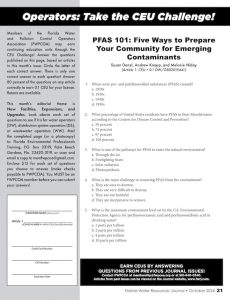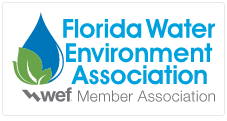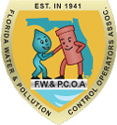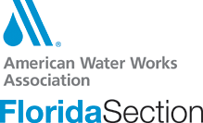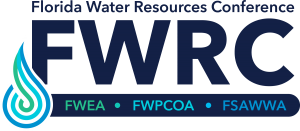Category Archives: Current News
PFAS Sampling and CCR Solution Launched to Support Utilities Navigating Evolving Regulations
120Water, a water quality compliance SaaS Platform, has announced its PFAS
Sampling and Consumer Confidence Report (CCR). This innovative tool simplifies
regulatory compliance while strengthening public trust and operational efficiency
for water utilities.
To date, more than 7,000 utilities across 48 states have successfully utilized the
platform to create and submit service line inventories and deliver required mail
notifications. With these milestones achieved, utilities are now well-positioned to
seamlessly prepare for the next regulatory actions they’ll need to take this year.
Building on these achievements, the tool can equip utilities to seamlessly tackle
the next wave of stricter regulatory requirements, including EPA’s Lead and
Copper Rule Improvements (LCRI) and baseline PFAS sampling required by 2027.
This tool simplifies this process by providing:
- Comprehensive Testing: Access to accredited labs ensure accurate, reliable
results. - Centralized Data Hub: Real-time sample tracking and reporting in one
platform. - Regulatory Guidance: Expert advice to navigate new requirements
confidently.
With service line inventory data and semi-annual reporting requirements
beginning in 2027, CCRs are increasingly critical. This solution transforms the
process by:
- Streamlined Processes: Automated workflows for easier preparation and
distribution to save time and resources. - Customizable Options: Flexible delivery methods like mail, email, and QR
codes to meet community needs. - Expert Support: Professional templates and tailored messaging to elevate
outreach efforts. - Community Engagement: Integrate communication into public
transparency dashboards to build trust and strengthen community
connections.
ASCE Accepting Applications for 2025 Excellence in Journalism Award
The American Society of Civil Engineers (ASCE) has announced that applications are now open for the
2025 Excellence in Journalism Award. The application process will close on March 2, 2025.
Journalists play a key role in informing Americans about the role of civil engineers in shaping
communities and the importance of improving infrastructure in the United States. For more than 20 years,
ASCE has given the Excellence in Journalism Award to a journalist or producer who has enhanced the
public’s understanding of the role and impact civil engineers have in designing solutions for clean water,
transportation, the electric grid, ports, and other public works projects. News coverage of these topics can
also influence vital infrastructure legislation, licensing laws and building codes.
Through this annual national award, ASCE encourages continued coverage of civil engineering
and infrastructure issues as a means of engaging the public in vital topics impacting their community.
Applicants will be assessed based on the following criteria:
– Fairly cover all sides of an infrastructure issue or civil engineering project.
– Feature a new trend transforming an infrastructure sector or civil engineering process.
– Effectively explain how a project or infrastructure trend benefits the community or region.
– Advance public knowledge and understanding of the civil engineering profession and
infrastructure issues.
The ASCE will honor stories from general-interest, nontrade-related regional and national
newspapers, magazines, electronic/web-based news outlets, and broadcast stations (podcast, radio, and
television). The story must appear in the twelve-month period ending Oct. 1, 2024. If a story is coauthored
or coproduced, at least one of the reporters must be a full-time journalist.
Entries should be submitted via the required nomination and submission form, which can be
found at www.asce.org.
FEMA Offers $1 Billion for Emergency Work in Florida After Recent Hurricanes
The Federal Emergency Management Agency (FEMA) has provided more than $1
billion to help Florida and its local communities with the cost of emergency
response to Hurricanes Milton, Helene, and Debby.
To date, FEMA’s public assistance program has obligated $608.6 million for
Hurricane Milton, $335.5 million for Hurricane Helene, and $102.2 million for
Hurricane Debby. The money reimburses state and local governments, and
certain nonprofit organizations, for emergency protective measures and the costs
of emergency response, debris removal, and restoration of disaster-damaged
public facilities and infrastructure.
For the latest information about Hurricane Milton recovery,
visit fema.gov/disaster/4834; for Hurricane Helene, visit fema.gov/disaster/4828;
for Hurricane Debby, visit fema.gov/disaster/4806.
Follow FEMA on X at x.com/femaregion4 or on Facebook at facebook.com/fema.
American Membrane Technology Association (AMTA) and American Water Works Association (AWWA) Awards: Nominations are Open!
Do you know a professional, pioneer, or facility that is doing excellent work to develop or use membrane technologies that create safe, affordable, and reliable water treatment solutions?
Help them gain the recognition they deserve!
Submit Your Nominations
Deadline: Nov. 15, 2024
Joint AWWA and AMTA Awards
Membrane Facility of the Year https://www.amtaorg.com/mtc-facility-of-the-year-nomination-form. Recognizes an outstanding water or wastewater facility using membrane technology with high efficiency in an environmentally friendly approach.
Membrane Plant Operator of the Year https://www.amtaorg.com/mtc-operator-of-the-year-nomination-form. Recognizes contributions to water supply improvement by an individual working at a facility using membranes for filtration, desalination, and/or water reuse.
Water Quality Person of the Year https://www.amtaorg.com/amta-awwa-joint-water-quality-person-of-the-year-nomination-form. Recognizes contributions to improving water supply by an individual in government, academia, research, or a related field.
AMTA Awards
David Derr Outstanding AMTA Member Award https://www.amtaorg.com/amta-member-of-the-year-nomination-form. Given to an AMTA member in recognition of outstanding individual effort to improve water supply via desalting or reuse.
AMTA Hall of Fame Award https://www.amtaorg.com/amta-hall-of-fame-nomination-form. Recognizes a pioneer and/or lifetime contribution by an individual to membrane technology and water supply improvement.

